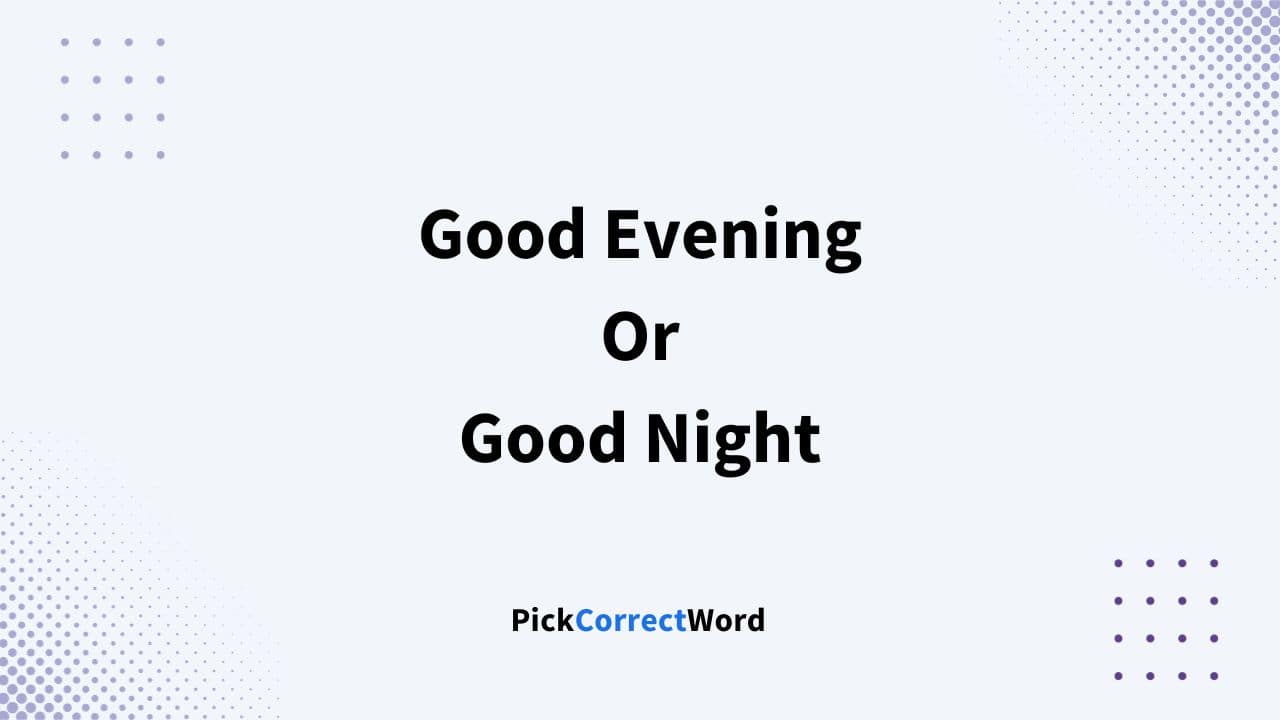Good evening is used to greet someone in a pleasant manner when the day turns into evening. It’s similar to saying hello and is used until it’s the end of the evening.
Good night is what you say when the evening comes to a close, indicating that the day has ended and you or the person you’re speaking with are about to sleep or not see each other until the next day.
Good Evening or Good Night? What’s the Difference?
The primary distinction between “good evening” and “good night” is this:
“Good evening” is a greeting, while “Good night” is a farewell.
Typically, good evening is said when you meet someone for the first time in the evening hours, starting from around 5-6 PM until it becomes dark.
Meanwhile, you say good night when you’re wrapping up a chat or meeting. This means that either you or the person you’re talking to is about to go to bed or finish their day.
It’s useful to understand the appropriate context for each phrase:
- Good Evening
- Use when: Meeting someone during evening hours.
- Implies: A friendly initiation of social interaction.
- Good Night
- Use when: Parting ways or going to sleep.
- Implies: A conclusion to the interaction or day.
Keep in mind, saying good evening is like saying hello, a nice way to acknowledge someone when you meet them later in the day. On the flip side, good night suggests that you’re leaving, much like saying bye, and is usually used when the evening turns into night, typically after 8 PM or so.
It’s all about the timing and the intent behind the words that dictates which one to use.
“Good Evening”: Meaning and when to use
When you say “Good evening,” you’re simply saying hello in a way that’s usually meant for the later part of the day. Starting from around 5:00 to 6:00 PM, this greeting marks the end of work and the start of evening activities.
- “Good evening” is used as a polite greeting rather than a farewell.
- It is appropriate for instances when you are seeing someone for the first time in the evening.
Consider this when deciding between “Good evening” and another salutation. Use it to convey politeness and acknowledge the time of day when you encounter someone in the evening hours.
“Good Night”: Meaning and when to use
When you say “good night,” you’re typically showing that a conversation or the evening is coming to an end. It’s a way of saying goodbye, mostly used when you or the person you’re talking to are about to leave or going to sleep. Unlike “good evening” which you use as a hello, “good night” clearly suggests that the day is wrapping up.
To break it down:
- Use Case: As you leave a gathering or end a conversation late in the evening.
- Timeframe: Typically said after the evening is coming to a close, often later than 8:00 PM.
Here’s a quick guide on when to use “good night”:
| Context | “Good Night” Usage |
| Ending a conversation | When departing from friends late in the evening. |
| Before going to bed | When you or someone in your household is heading to sleep. |
| Ending a phone call | After talking with someone at a late hour. |
| Concluding an event | After an evening event or dinner, for instance, when guests start to leave. |
Examples of Using “Good Evening” in a Sentence
“Good evening, everyone, it’s great to see you all.”
“Good evening, distinguished guests and colleagues.”
“Good evening, do you have any tables available for two?”
“Good evening Mr. Jones, I’m writing to confirm our meeting for tomorrow.”
“Good evening, what lovely weather we have today.”
Examples of Using “Good Night” in a Sentence
“It’s been a wonderful evening, everyone. Good night!“
“Sleep tight and good night”
“Thanks for the chat, good night and take care.”
“We will discuss more tomorrow. For now, good night.“
“I had a great time tonight; good night.“
Good Evening Vs. Good Night: US Vs UK English
In both UK and US English, “good evening” and “good night” basically mean the same thing. Though there aren’t any big differences, you might see some slight changes in social habits and what’s expected.
For example, in the UK, you might find “good evening” being used a bit later, particularly in formal situations or in winter when it gets dark early.
On the other hand, in the US, you might see people switch from “good afternoon” to “good evening” a little earlier when in relaxed settings.
Frequently Asked Questions
At what time should one switch from saying ‘good evening’ to ‘good night’?
Typically, “Good evening” becomes “Good night” when nightfall occurs, often considered to be around the time people finish dinner or late evening activities, approximately after 8 PM.
Is ‘Good night’ used as both a greeting and a farewell?
No, “Good night” is generally not used as a greeting. It is predominantly a farewell phrase implying that either you or the person you’re speaking to is retiring for the evening.
Can ‘good evening’ be used at late hours such as 9pm or 11pm?
“Good evening” can still be used as a greeting up to around 10 PM. Beyond that, it is usually more appropriate to switch to “Good night,” unless the social context justifies a late evening greeting.


